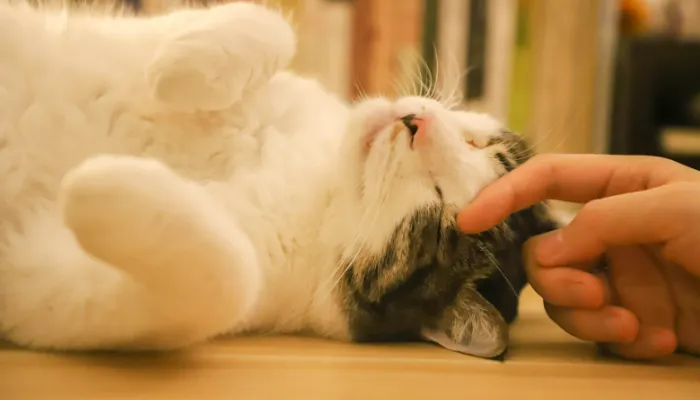Cats are not very expressive in comparison to dogs, which means that cats have their unique ways of expressing apologies, which are extremely nonchalant.
If your cat has done something that makes you displeased, for instance, breaking a glass, scratching a piece of furniture, or biting a bit too hard, you would normally ask yourself, ‘How do cats say “I’m sorry”, and the chances are, you would not get a proper answer. While there are different cat translator devices, some signs might answer your question.
In this article, we are going to better the understanding of feline behavior and how it is linked to cats apologizing, and what steps would need to be taken to encourage these gestures.

How Do Cats Communicate Apologies?
Without verbal communication, it is hard to express oneself, yet a cat still manages to do so. Rather than using complex language systems, cats employ nonverbal gestures, changing facial cues, and even sounds. Cats possess the ability to apologize, however, in order to fully capture the essence of this gesture, one must diaper their attention and examine closely.
Here’s how you know your cat is attempting to apologize:
- Slow Blinking: Associated along with trust and comfort, a slow blink is accompanied in a cat as a gesture after a quarrel or post-fight.
- Head Butting: Bunting – also known as head butting means an attempt to settle differences and come together after a quarrel.
- Soft Purring: The purr of an animal can indicate tranquility, and can also be a way for them to calm you down.
- Apologetic Kneading: This action, typically linked to kneading behavior, can show an expression of remorse when your cat is feeling close.
- Gifting: From a stuffed animal to an actual gift from outdoors, your cat may be bestowing it’s token of apology.
Cats may not apologize in the same way that humans do, however, they too have their own way of trying to mend a relationship.
Signs That Your Cat Is Saying “I’m Sorry”
Now since you understood the basics of cat communication. Let’s move to our main question – How Do Cats Say “I’m Sorry”? Here are some common signs of how cats apologize.
1. Incidents Interaction Distance
There is a high likelihood that if your cat approaches you after doing something wrong, it is accepting your reprimanding towards them. Cats can understand people’s feelings, and will try to promote reconciliation by staying nearby or rubbing against you.
2. Meowing or Soft Chirping
While your pet is chirping after doing something wrong, it is doing so to express deep regret and sadness. If they are holding their tail down and it doesn’t seem like they are moving, they might be seeking forgiveness.
4. Attempting To Clean You Or Themselves Around
Cats unclench their guard and wrestle in self-grooming behavior, but also do this for humans who are deemed worthy. If your cat’s licking you during a heated moment, it might just be saying sorry.
5. Resting Close To You
If a cat has decided to snooze beside you, it is a demonstration of trust and safety. If your cat becomes a burrito with themself and someone else in bed, your presence is needed for their safety. This act is usually done to blend in with other humans.
All of these actions can assist you in fully understanding how do cats say “I’m sorry” as well as how they convey their feelings.
How to Respond to a Cat’s Apology?
Giving a reward after scolding indicates that you heard them and are forgiving, similarly you can help your cat after it tries to apologize to you.
1. Accept Their Apology
Cats, like humans, respond well to praise, so try to make accepting their apology your goal. By blinking at your pet give away that you understand their message. Now they can rest easy, knowing that their message reached the destination.
2. Speak Using Soft Tones
Some cat owners find it very easy to be overly verbal. This stems from a very deep-rooted urge to protect. When you’re feeling frustrated, just breathe before letting your cat know by gently talking to them so they can feel your state of mind.
3. Give Touching Affection
Some cats don’t seem to like to be touched, but others do. If your cat approaches you nuzzles you or leans in, ensure to gently tenderly stroke them.
4. A Game as an Example of a Reset
A cat can also feel more comfortable with them while participating in play that they direct. Toys with wand, lasers, or feathers can change their focus and energize the bond between the two of you.
It is incorrect to think that cats do not conduct them in the same manner as people. Their understanding of gestures demonstrates much deeper thinking than ordinary logic.
Conclusion
So, how do cats say “I’m sorry”? Cats apologize by slow blinking, purring, head rubbing, and offering ‘gifts’ such as dead animals. They may not show it, but their actions do the talking.
Next time, do not be so quick to take offenses. The manner your cat approaches you after a wrong is his way of shedding a strong message of “I didn’t mean it!” By knowing how do cats say “I’m sorry”, we can further enhance our relationship with them.
